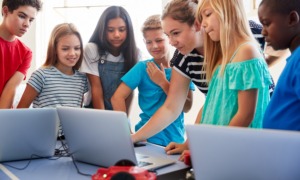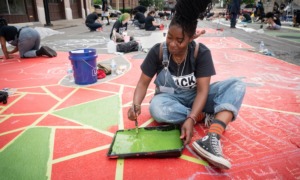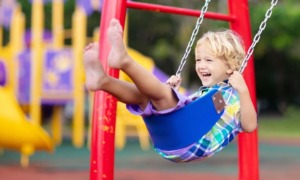This summer, at the age of 36, I decided it was time to go back to college. I slept in the dorms, ate in the cafeteria and took a full load of classes. Not to earn a degree, but to help 500 low-income, urban students entering 9th grade discover answers to two burning questions many of them ask but rarely have adequately answered: “Why do I need to be in school? and “How will anything I learn be useful to me in real life?”
To help students find their answers, staff from After-School All-Stars (ASAS), created CampUs, a one week, overnight transition for program for young teens at six college campuses including San Jose State, San Diego State, University Nevada Las Vegas, University of Hawaii, St. John’s University and Florida International University.
CampUs was designed in response to America’s well documented high school drop out crisis. Recent research from America’s Promise and Johns Hopkins University detailed that 1.2 million students drop out annually – one every 26 seconds.
The program’s strategy, which specifically targets eighth grade students, was based on input from issue experts, families, students groups and our national youth advisory board. The lessons we learned from these groups are valuable for any youth worker or program interested in getting kids to grasp the value of going to college.
First: Numerous students told us that adults only share with them negative reasons to finish school and attend college, i.e. “If you don’t graduate, you’ll end up broke, in jail, unemployed, a disappointment to your family.” While there may be some statistical truth in these answers, they are not particularly positive, persuasive or motivating to a young teenager. The CampUs program went the opposite way, highlighting the compelling, fun and exciting reasons to finish high school and attend college – a sense of accomplishment, higher pay, more career options, long weekends, a chance to study what you like, be away from home, live in a beautiful and safe place, study abroad, make new best friends and interact with new experts, people, cultures, activities and ideas every day. These are the reasons many people call college the best years of their life. Somewhere along the line, educators forgot to sell low income youth on the benefits of school.
Each morning, CampUs students participated in two 90-minute classes on what life is like in high school and college. They learned study skills, about the SATs, created personalized four year plans and identified the strategies and requirements it takes to graduate. They even acted as a college admissions team assessing the high school careers of different students. In their college classes, they picked majors, visited various departments, such as law, architecture, and film and completed their own “mock college application” including a personal essay, recommendation letter, resume, and in-person interview. On the last day, we held a mock “2015 college acceptance ceremony” where students turned in their finished applications and received a “personal letter of acceptance ” and support from our staff to help them visualize the process.
Second: Students shared that they did not personally know enough people from their communities who could show them how to do well in high school and college. As one student said, “I always thought college was something white people did on TV.” Sometimes we meet students who don’t even realize their own teachers went to college. To make those introductions and build those personal relationships, each camp brought in five college-bound 12th graders to serve as counselors-in-training as well as current college students involved in the acclaimed Posse Foundation to serve as counselors and role models. Many of these staff members grew up in the same neighborhoods, schools and circumstances as our students and could share what school was like right now. Having extensive multi-layered mentoring take place between middle, high school and college students is rare, and extremely powerful. For every student, there were now many tangible examples of success stories right in front of them. Through both informal and formal sessions, our mentors demystified all the steps and challenges the students will soon face.
Third: Too many students fail to recognize their own leadership potential and the usefulness of school in helping them to effect changes in their lives and communities. At ASAS, we believe that while not everyone may be a great student, anyone can be an exceptional leader in their own way given proper training, opportunities and support. Thus, at CampUs, we held daily 90 minute leadership workshops where students learned about policy issues and public speaking, project planning and consensus building skills. Students worked in small teams to identify and research community problems, and then developed and presented their solutions. We saw personal and innovative presentations on issues such a homelessness, gang violence, healthcare and teenage pregnancy. We stressed that they are the “captains of their own destiny” and how their leadership skills can help them excel in high school, serve others and gain acceptance to college.
Fourth: We learned that when adults ask them what they want to be when they grow up, they often want to say, “Can you please let me know my options?” As adults looking back, we can often make clear sense of the pattern and steps that led us to where we are in our careers. However, if you are an 8th grader looking at your life moving forward, that pathway is completely unclear.
In an effort to show the range of opportunities before them, we held nightly career panels at CampUs. Leaders and role models from different work sectors including government, media, non-profits, sports, science and technology joined us to talk about their personal career paths. Students heard from TV reporters, entrepreneurs, school superintendents and foundation executives and learned how a high school and college degree connect and can lead to the careers they want.
The experiential learning at CampUs is immediate and lasting. We hope more colleges, non-profits and school districts will collaborate to make more free, overnight college campus programs like Gear Up and CampUs more widely available to high school students. Moving forward, ASAS will track our participants through high school and expand the program. While CampUs was not an academic boot camp designed to move test scores, it does help kids answer their two burning questions and move to take ownership of their own learning.
Aaron Dworkin is the executive vice president of After-School All-Stars, a national organization offering free daily afterschool programs to 81,000 elementary and middle school students in 12 cities.































